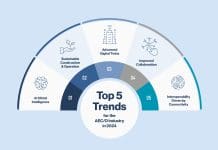The pitfalls of using industry averages for construction cost benchmarking
As a construction estimator, you’re under pressure to work quickly. As soon as you finish one bid, you’re on to the next. Faced with a never-ending workload, your ability to produce estimates efficiently is key. But speed isn’t the only thing that matters. You’re also expected to produce construction bids that are as accurate as possible.
Cost benchmarking provides a methodology to check your estimates against typical costs to gain more assurance of their accuracy. Industry cost averages are one source of cost benchmarks. This information is fairly easy to come by and seems – on the surface, at least – like a decent source of information for producing a construction estimate that’s reasonably accurate.
But general construction cost averages are not the best data source for cost benchmarking.
While they may seem good enough because they’re backed by project data, industry cost averages are limited in their ability to help you produce precise estimates. More likely, they’re too generic to accurately reflect the details that can significantly affect costs, making them an unreliable source for cost benchmarks.
Generic cost averages can’t ensure accurate construction estimates
The reality is that third-party data has the potential to be misleading, especially when you don’t have a full understanding of where it’s coming from and how it was compiled. Construction cost averages are no exception.
When you use generic averages for cost benchmarking, you’re relying on costs without a clear understanding of how they were derived. They may give you a general idea of the cost of a certain kind of labour or material type, but they fail to account for a number of variables.
As an estimator, you know that each construction project has unique qualities that play a factor in what the actual costs will be. In fact, part of your job as an estimator is to account for all of those different factors as best you can to ensure the quoted bid is as accurate as possible.
But if you’re building your estimates on industry averages, you’re building on shaky ground. You have no visibility into the specific details that could have a significant impact on price, including:
- Geographic location: Regional variables can have a big impact on labour and material costs. Generic cost averages typically don’t account for these localised nuances, which can be a major factor in the overall cost of the project.
- Type of project: Different projects have different requirements. Building a new hospital is nothing like constructing a football stadium. If the industry averages you’re using don’t account for these differences, they’re not factoring in variables that can impact costs.
- Timing: Weather conditions vary at different times of year and material costs can be affected by availability. General economic conditions at the time the averages were compiled may be different than they are today. All of these factors can impact costs.
If your cost benchmarks are based on averages that are too generic, your final construction bids are at risk of being inaccurate. Industry cost averages that fail to normalize pricing to account for location, project type and timing are swags at best.
Using industry averages doesn’t position you for competitive advantage
The appeal of industry cost averages is that they’re readily available. But that’s also part of the problem. If you’re using them as part of your construction estimating process because they’re convenient, it’s a pretty safe bet that your competitors are using the same approach.
You can see the pitfall in this. Arguably, the estimating process is a critical first step in setting your company apart in the eyes of an owner and winning the business. If your estimates aren’t giving them anything different and better, you’re missing an opportunity to position yourself as the best company for the job.
Beyond their obvious purpose, your construction bids have the potential to be a valuable selling tool. When they’re developed based on the actual costs of similar projects you’ve completed, they communicate your experience and success, which demonstrates that this isn’t your first rodeo.
Unfortunately, many construction companies are operating with a “throw it over the fence” mentality. When departments are working in a siloed fashion, they’re missing an opportunity to learn from their collective experiences and apply this shared knowledge to continuous improvement.
As it applies to your estimating process, if your estimators aren’t privy to how their bids stack up against a project’s actual, as-built costs, they’re unable to learn from and apply this valuable feedback. They’re missing an opportunity to continually refine their estimates to best reflect the way your company works and the way your projects actually play out.
This leaves them unable to make your estimates as accurate as they could be. It also makes it impossible for your estimates to position your past experience in a way that reflects your relevant experience and positions you to win.
Set yourself up for success by using your actual, as-built costs for benchmarking
Using industry cost averages is an easy way to incorporate cost benchmarking into your estimating process. But relying on this generic data to produce precise estimates is a sketchy proposition. And it does little to leverage your previous experience and success.
When it comes down to it, the only reason to use industry averages for cost benchmarking is if you don’t have anything better to work with. But you do. If your company is like most construction firms, you’re sitting on an extensive history of project costs.
This information is like buried treasure. But it probably looks more like rows and rows of dusty filing cabinets or boxes filled with old project files. If your past project data remains hidden away in hard-to-access paper files, it has little value. You need to excavate it and put it in a form that allows you to mine the golden nuggets it holds.
Trimble MEP
Tel: +44 (0)1908 608833
www.constructible.trimble.com/europe
Please note: this is a commercial profile.

















